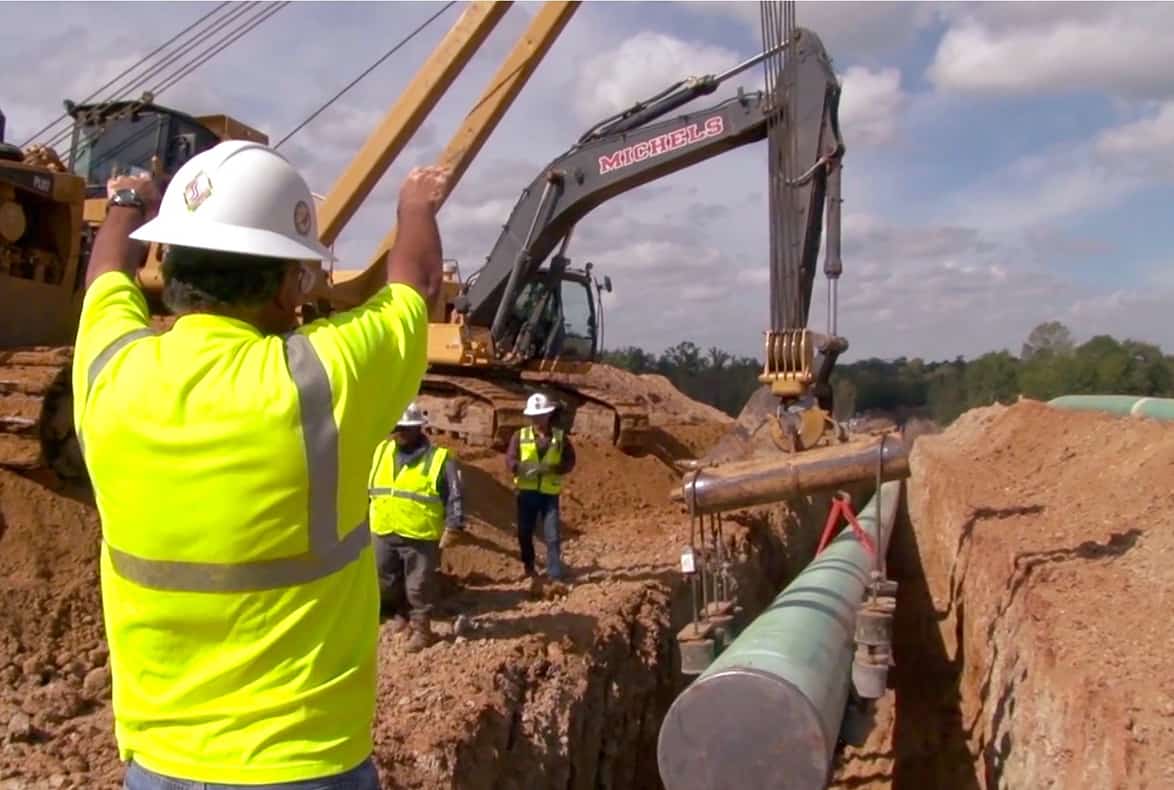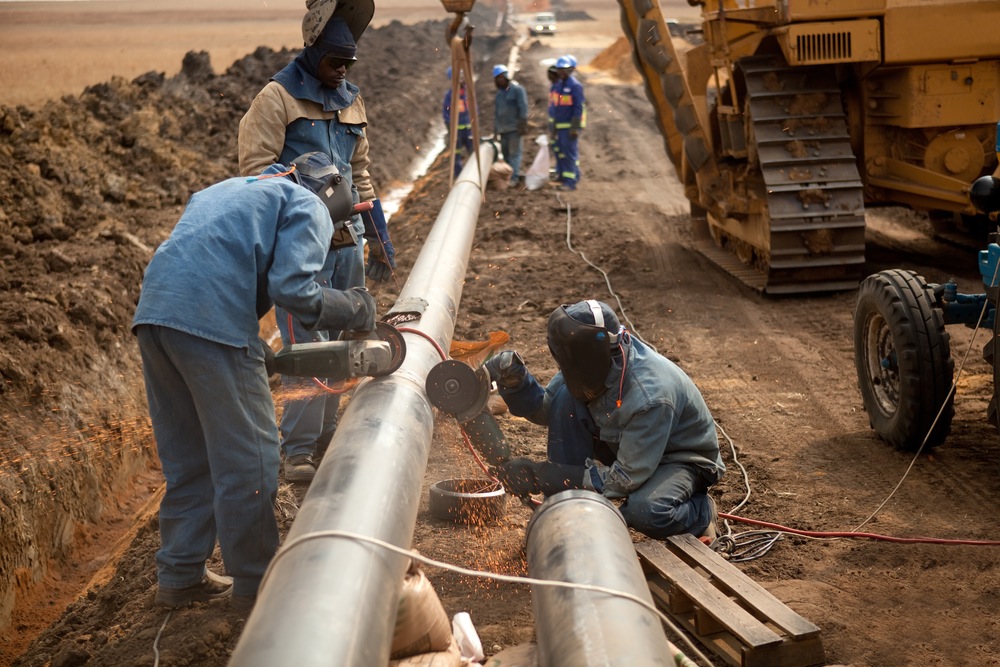What Contractors Must Understand About Creek Pipe pipeline construction
Wiki Article
What You Must Know Regarding Pipe Trenching Providers: An In-depth Overview of Available Options
Pipe trenching solutions are crucial for the installation and upkeep of underground energies. They involve different approaches tailored to particular demands and environments. Recognizing these methods is key for reliable job execution. Each choice presents its very own set of benefits and difficulties. As the need for efficient energy management boosts, knowing what to take into consideration when selecting a trenching service ends up being necessary. What elements should one focus on to assure success?Understanding Pipe Trenching: What It Is and Why It Matters
Although usually forgotten, pipe trenching is an essential process in different construction and energy jobs. This strategy involves excavating narrow trenches to assist in the installment of pipes for water, gas, sewer, and telecommunications. The significance of pipe trenching lies in its role in guaranteeing that these vital systems are effectively incorporated right into facilities, allowing the risk-free and reliable distribution of needed services.Proper trenching is crucial for maintaining the integrity of pipelines and reducing risks linked with dirt erosion and collapses. It additionally allows for effective assessments and maintenance of below ground energies. In addition, recognizing the neighborhood policies and ecological considerations is vital, as incorrect trenching can result in pricey delays and legal concerns. Ultimately, pipeline trenching acts as the foundational action that supports numerous building ventures, making it a substantial facet of modern-day infrastructure advancement.
Typical Trenching Techniques for Below Ground Utilities
In the domain of below ground utilities, different trenching approaches play a vital function in setup and upkeep - Creek Pipe Texas oilfield. The open-cut trenching technique, directional boring technique, and hydro excavation procedure each deal one-of-a-kind benefits depending on the certain project needs. Recognizing these approaches is vital for efficient and effective utility managementOpen-Cut Trenching Technique
Open-cut trenching is a widely made use of method for setting up underground energies, especially when the deepness and width of the trench permit effective access. This technique entails digging deep into a trench along the suggested course of the utility, giving straight visibility and availability for installment. It is particularly beneficial for projects that need substantial excavation, as it promotes fast installment and examination. It also demands mindful planning to minimize disturbance to the surrounding area, including website traffic and existing structures. Open-cut trenching is most effective in open spaces where the dirt conditions are beneficial, but it might be limited in metropolitan environments as a result of the presence of existing utilities and various other below ground challenges.Directional Boring Method

Hydro Excavation Process
Exactly how does hydro excavation stand out among typical trenching approaches for below ground utilities? Hydro excavation uses high-pressure water and vacuum technology to safely remove soil, enabling for specific excavating around delicate below ground energies. This method reduces the danger of damaging existing framework contrasted to traditional mechanical excavation. By employing water to loosen the dirt, hydro excavation supplies a less intrusive approach, reducing the potential for soil compaction and making certain a cleaner worksite. In addition, the process improves visibility throughout excavation, improving general precision and efficiency. Hydro excavation is particularly valuable in urban areas where utility lines are densely loaded, making it a favored selection for contractors concentrated on safety and security and accuracy in below ground tasks.Benefits of Trenching Providers
While different approaches exist for setting up underground energies, trenching services use unique advantages that make them a preferred selection for lots of tasks. One significant advantage is the cost-effectiveness of trenching, as it typically calls for much less specific equipment compared to options like hydro excavation. This frequently results in reduced labor and functional costs. In addition, trenching can fit a large range of energy kinds, consisting of water, drain, and gas lines, providing convenience for contractors.Moreover, trenching permits effective accessibility to several lines in a solitary excavation, minimizing disturbance to the surrounding area. The go procedure likewise makes it possible for accurate installment and repair service, which is crucial for sticking to regulatory standards and making sure long-term integrity. Inevitably, trenching can be carried out relatively swiftly, minimizing task timelines and enabling for faster solution restoration. These advantages jointly make trenching solutions a practical choice for several below ground energy jobs.Drawbacks and Difficulties of Trenching
Regardless of the numerous advantages of trenching services, there are remarkable negative aspects and challenges that should be considered. One considerable obstacle is the capacity for dirt instability, which can bring about collapses, posing risks to workers and equipment. Furthermore, trenching can interrupt existing energy lines, requiring careful planning and sychronisation to prevent service disruptions. The process can likewise be lengthy, especially in metropolitan locations where space is restricted and gain access to is restricted. Furthermore, trenching may require comprehensive permits and regulative compliance, adding complexity and potential hold-ups to jobs. Ecological problems, such as dirt erosion and damage to regional communities, can emerge from inappropriate trenching techniques. The costs linked with trenching, including labor and tools, can intensify if unexpected concerns occur throughout the task, making it vital for stakeholders to consider these difficulties versus the advantages when thinking about trenching solutions.Key Variables to Take Into Consideration When Selecting a Trenching Service
Picking the best trenching solution can significantly affect the success of a project. A number of vital elements must be examined to guarantee an ideal selection. The business's experience and competence in trenching operations are necessary; a reputable service with a solid track record is commonly a lot more reliable. Next off, reviewing the equipment utilized is fundamental, as contemporary equipment can improve efficiency and accuracy. Additionally, it is significant to think about the series of services used, including excavation deepness and soil kind handling, to confirm they meet details project requirements.Another variable to review is the firm's online reputation; consumer reviews and testimonials can give understandings into previous efficiency. Getting comprehensive quotes that outline costs and timelines will help in spending plan administration. Ultimately, confirming conformity with neighborhood guidelines and sector requirements is important for preventing potential lawful issues. By mirroring on these aspects, clients can make an educated decision when choosing a trenching service.Safety And Security Steps in Pipe Trenching
In pipeline trenching, safety and security steps are essential to ensuring worker security and website integrity. Trick components consist of making use of individual protective devices, comprehensive excavation website assessments, and distinct emergency feedback protocols. Implementing these actions significantly lowers risks related to trenching operations.Personal Safety Tools
Safety in pipe trenching greatly relies upon the correct use individual protective equipment (PPE) Workers need to wear construction hats to secure versus falling things, as well as high-visibility vests to improve their presence on-site. Steel-toed boots are vital for foot security versus heavy equipment and materials. Furthermore, handwear covers are very important for hand safety, especially when handling rough or sharp objects. Respirators visit this website may likewise be essential in environments with dust or hazardous fumes. Eye protection, such as safety goggles, should be worn to secure versus debris. Finally, listening to defense is crucial in loud job settings. By sticking to PPE standards, workers can considerably minimize the threat of injury and assure a more secure trenching procedure.Excavation Site Evaluation
Correctly evaluating the excavation website is a basic step in guaranteeing a secure pipe trenching procedure. This procedure involves evaluating the website for prospective dangers such as underground utilities, unpredictable dirt problems, and close-by structures. A complete evaluation permits for the identification of risks that might endanger employee safety and security. In addition, verifying the dirt type and dampness degrees can help determine ideal shoring techniques to stop trench collapses. It is important to ensure that double sink plumbing the website is free from particles and that correct signage is displayed to alert employees of ongoing procedures. Routine inspections throughout the job can likewise aid find any modifications in website problems, allowing prompt changes to safety procedures and work methods.
Emergency Situation Response Protocols
Emergency reaction methods are important in mitigating dangers connected with pipe trenching operations. These methods ensure that all employees are prepared to act promptly and properly in emergency situations. Crucial element consist of normal safety and security drills, clear interaction networks, and marked fire escape. Additionally, first-aid sets and emergency call numbers need to be conveniently obtainable on-site. Trenching procedures need to likewise consist of treatments for taking care of harmful circumstances, such as cave-ins or energy strikes. Educating employees on acknowledging prospective risks and recognizing their duties throughout an emergency is crucial. Preserving an updated website safety strategy can considerably enhance response performance. On the whole, reliable emergency readiness promotes a more secure working atmosphere and decreases the impact of unanticipated events.Price Considerations for Trenching Services
Recognizing the financial ramifications of trenching solutions is essential for job planning and budgeting. The expenses connected with trenching can vary extensively based on several factors, consisting of project size, dirt kind, and deepness of the trench. Labor expenses often represent a substantial section of the total cost, as skilled operators are needed for reliable execution. Furthermore, tools service fees can add to the overall budget plan, specifically for specialized machinery.Site ease of access is one more crucial factor; challenging surface might demand added sources, raising costs. Permitting and regulatory compliance can also contribute to expenditures, specifically in urban locations where guidelines are stringent.Lastly, unanticipated difficulties, such as experiencing existing energies, can cause unforeseen expenses and hold-ups. Consequently, obtaining comprehensive estimates from reliable trenching service carriers is important for accurate budgeting and ensuring successful job completion.Regularly Asked Inquiries
How Long Does a Typical Pipe Trenching Project Take?
The duration of a regular pipeline trenching job varies considerably based on variables such as deepness, soil conditions, and task complexity. Generally, it can take anywhere from a couple of days to numerous weeks to complete.What Equipment Is Generally Utilized in Pipe Trenching?

Are There Environmental Rules for Trenching Activities?
Environmental guidelines for trenching activities typically require conformity with local, state, and federal guidelines. These guidelines intend to minimize eco-friendly disruption, secure water resources, and warranty proper waste management throughout excavation and installment processes.
Can Trenching Services Be Integrated With Other Construction Jobs?
Trenching solutions can without a doubt be incorporated with numerous building and construction projects. By collaborating efforts, effectiveness can be accomplished, lessening interruptions while guaranteeing that all needed facilities job is finished in a timely and economical way.
What Are Common Soil Keys In Run Into in Trenching?
Usual dirt types encountered in trenching include clay, sand, silt, and loam. Each type provides distinct challenges, affecting excavation approaches and security, requiring mindful planning to guarantee secure and reliable trenching procedures.Report this wiki page